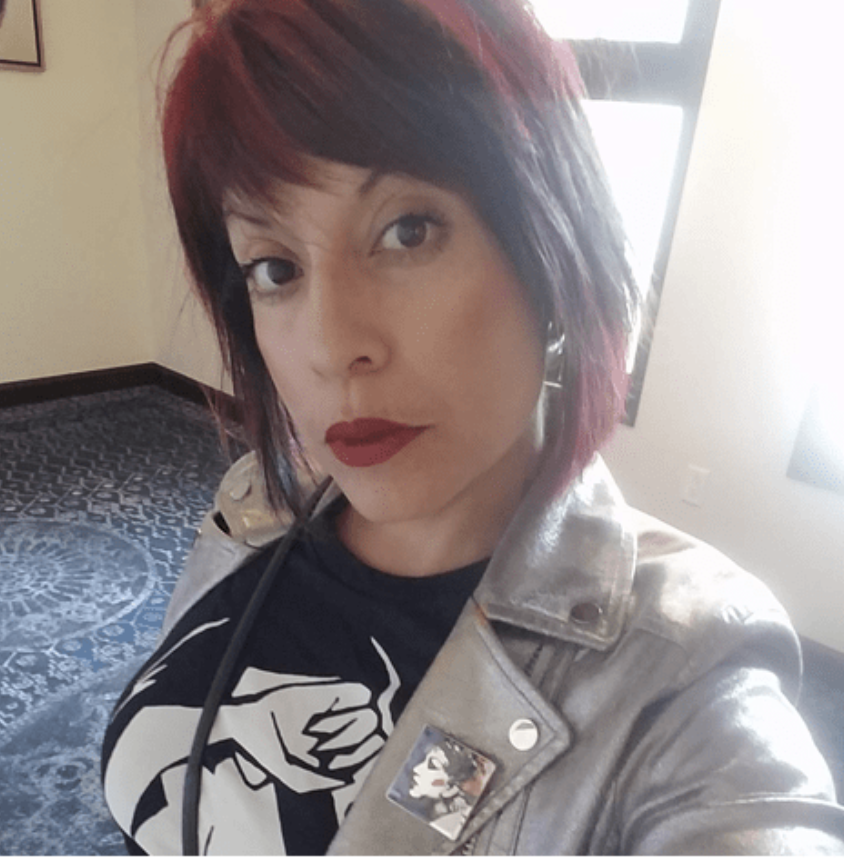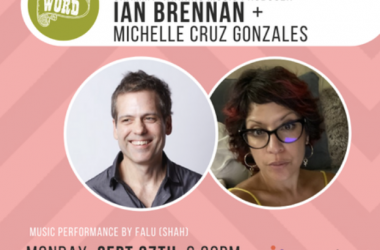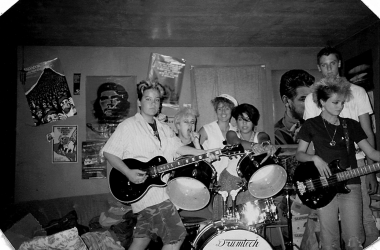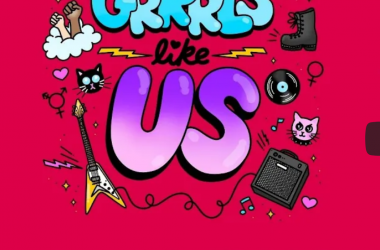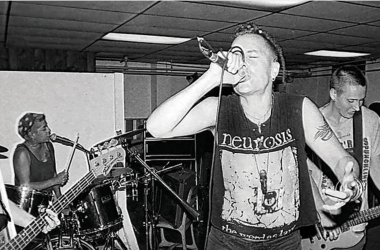By Michelle Cruz Gonzales
Razorcake
October 6th, 2020

I silenced a room twenty-seven years ago while in Spitboy with the
declaration, “We’re not a riot grrrl band,” in front of members of
Bikini Kill. Still, I have always liked Bikini Kill’s music and what
they stand for. Why wouldn’t I? Perhaps I learned the answer May 2, on
their final Los Angeles reunion show at the Hollywood Palladium, where I
spent most of their set standing outside on the upper patio wishing I
still smoked cigarettes. At least I could breathe out there away from
the hot lights, the hype, the crowd, and my eighty-dollar place to stand
on the balcony with my friends where I couldn’t enjoy a single song
even though I wanted to.
I was in the L.A. area to give a talk
at UC Riverside’s first-ever conference on punk that same week. I
figured more punk wouldn’t hurt. But it did. Confusing and painful
feelings, new and familiar, washed over me—annoyance, sadness, anger,
envy—feelings that took hold and I couldn’t shake.
On the way
to the show, I got a text from a friend who forwarded a post from the
band Fuck U Pay Us. They had opened for Bikini Kill the night before and
wrote about what sounded like a terrible experience: transphobic
treatment by the security at the Palladium. This treatment was not
directly Bikini Kill’s fault, but they did not make a public statement
against such treatment either. A few nights before, still home in
Oakland and thinking about punk matriarch Alice Bag opening for them, I
dismissed my annoyance choosing to follow the logic in the unfortunate
reality headlining a show at a venue like the Palladium: ticket sales
and draw. I can see how Bikini Kill asking women of color, teenagers,
and a Latina sexagenarian was a genuine attempt at using their privilege
to amplify acts that could benefit from such amplification, but was
choosing not to make a statement about the treatment of Fuck U Pay Us a
pattern? Then there was my own pattern of critiquing them. Maybe reunion
shows are just a trap. Maybe they are a case of damned if you do,
damned if you don’t.
***
I’ve had the same recurring dream for several years.
Spitboy has decided to reform. We have just a few days before our first
reunion show and for some reason, or for many, we haven’t practiced. I
realize I don’t remember how to play any of the songs.
In the
most recent version of the dream, Spitboy is about to fly overseas.
Wracked by complete panic, I scramble to figure out what to do, and then
I feel a sudden rush of relief when I wake up in the dark.
***
Out on the balcony at the Bikini Kill Palladium show, I looked out at
the row of lights that rim the perimeter and the people milling about. I
wondered why so many others were outside and if my friends had noticed I
was gone.
I paced around in my Spitboy T-shirt trying to figure out why I felt like I was crawling out of my skin.
Maybe it was all the riot grrrls, all the adoration, all the photos by
just about everyone I know in the Bay Area who drove to L.A. to attend
one or all of the shows, all the long, dramatic Facebook posts about
what they meant to them while growing up. Maybe it was that being in a
band that was not a riot grrrl band in the 1990s always means the risk
of being forgotten. Maybe it was everyone around me singing every word
to every song. Maybe I was jealous Tobi Vail got to play drums (I’m
always jealous of other drummers). Maybe I still disliked how Kathleen
trots around on stage like a cheerleader. Maybe I was just being petty,
but I really had expected to have a good time.
***
In 2016, I joined Kamala And The Karnivores for what turned out to be a
series of reunion shows. We were asked to reform and play a Lookout
Records band reunion show at 924 Gilman in Berkeley. Having been a
relatively short-lived band, and a precursor to riot grrrl in sound and
sentiment, we decided to play the show for many of the reasons other
bands reform, with some important exceptions: We knew we would make no
money and our music wasn’t about to be launched on streaming services.
In the end, because it took so much time to relearn the songs, we
decided to play several shows. Then I convinced the band to record all
the Karnivores songs that we never recorded in an effort to preserve our
place in punk herstory. I wanted to document the work, but we were
never going to write new songs, or continue on for very long, and we
knew that.
In a Pitchfork interview with Erika Dawn
Lyle, the guitarist who replaced Billy Karren for the tour, spoke
eloquently about reasons she joined the band to do the tour, citing many
of the same reasons Kamala And The Karnivores chose to reform, noting
this “tremendously misogynist moment in America,” and their ages. “I
also think there’s a lot of societal pressure for middle-aged women to
simply disappear,” said Lyle. “It’s powerful for Bikini Kill to come
back as older women …” The Karnivores felt similarly. Why should all the
Lookout dude bands reform and not us? Middle-aged women who stopped
playing music to go to school, have children, and a career can learn to
play their instruments again, memorize the songs, and wear dog collars
on stage, too.
There were other reasons the Karnivores decided
to reform, the most important: We missed each other and we loved playing
our songs—“Love Like Murder,” “Tiny Steps,” “Back to Bodie,”
“Disappear”—love songs that only feminists could write and songs about
sisterhood.
***
I needed to sort through my feelings in order to make sense of the fact I was having a terrible time at a show I had paid a lot of money for and elected to attend.
I sat down on a bench on the Palladium patio. I could actually
enjoy the music a bit from there, too, and I needed to sort through my
feelings in order to make sense of the fact I was having a terrible time
at a show I had paid a lot of money for and elected to attend. To help
understand what made me buy the tickets, I made a list:
a) I’ve always liked Bikini Kill’s music and lyrics
b) I was going to be in town anyway
c) Women should support other women
d) I didn’t want to be a poor sport
d) Fear of missing out
That last one that really got me. What I wouldn’t have given at that
moment to have turned back time and simply stayed in the hotel where I
had rented a room with my mom (who was with me for the conference),
where we could have had a drink and a good laugh in the city of our
births by the coffin-shaped pool.
Had I really spent eighty
dollars and left my mom, who is a hundred times more fun and a hundred
times more punk than any punk band, in a hotel by herself because I
didn’t want to feel left out?
Maybe it was a form of FOMO that
made me want to record and stream all the unrecorded Kamala And The
Karnivores music. Maybe it was a form of FOMO that made me want to write
The Spitboy Rule: Tales of a Xicana in a Female Punk Band. Maybe it’s a form of FOMO that Spitboy will re-release their catalogue of music on vinyl sometime next year.
While the term FOMO is relatively new, the feeling is not.
Before Bikini Kill’s set, I watched Alice Bag perform with Les
Butcherettes, another moment when I questioned the wisdom of reunion
shows. As I watched Alice plant her feet on the stage next to Teri
Gender Bender and belt out her line of the song, I thought again about
how she had opened for Bikini Kill there just a couple of nights before.
While it’s important to add Alice has told me she did not feel
tokenized by Bikini Kill and that she was happy to play the show, it
just didn’t seem fair Alice opens for anyone. It makes sense, though,
given her recent collaborations with Kathleen Hanna. It also makes sense
since Alice continues to release new music, to write new songs—some of
the best songs that she’s ever written—yet she never headlines the size
of venue or audience that her import in punk herstory deserves. An
opportunity to play the Palladium with Bikini Kill or Jawbreaker gives
her the chance to do that. Alice, who truly is a first-wave punk legend,
who made music alongside bands like The Germs, The Zeros, The Go-Go’s,
Joan Jett at the same time as Poly Styrene and X-Ray Spex, The Clash,
and The Slits.
Maybe I’m too deferential.
Maybe it’s a cultural thing.
Maybe I found the place where my punk anti-authoritarianism,
buck-the-rules values clash with my Mexicanisma and my respect for my
elders, even my punk elders.
Maybe other people feel this way too.
It’s true Alice Bag paved the way for my first bands Bitch Fight and Kamala And The Karnivores.
But it’s also true she is both a legend and a contemporary, an artist
in her own right, who is once again by virtue of existing, a queer,
Chicana punk, and making the best music of her life in her sixties and
forcing us to reexamine our punk values and ethics.
But
regarding the rest of us, I still have to ask. Can reunion shows ever be
anything but a trap? Maybe my recurring dream where Spitboy is about to
play and I realize I don’t know any of the songs is a warning to
remember that while a Spitboy reunion might be expected, there are all
sorts of reasons why it wouldn’t work and why it scares me in the first
place. Of course, Spitboy could never draw a Bikini Kill-sized crowd or
ever be booked at a venue like the Palladium, but even if we played a
couple of nights at 924 Gilman, is it possible to reunite for the right
reasons when money, ego, and “likes” are involved? It’s obviously a
rhetorical question, but if you’re going to do it at least consider the
following:
• Do you like each other?
• Is nostalgia enough of a reason to reform?
• Consider the very real issue of ageism that impacts women in music, as Bikini Kill has done
• When involving living legends, have careful conversations about how that can be done as thoughtfully as possible
• And as Bikini Kill did, do elevate younger, not as well-known acts
• Younger, not as well-known acts of color could really benefit
• Consider acts who you know are fans of your work
• If you’re all white, maybe elevate non-white acts, but do not tokenize.
• One Asian opening band, one black, and two Latinx fronted/dominant bands feels like tokenization
• If you include trans or non-binary folks, ensure a safe space
• Donate record and streaming proceeds to a good cause where they can
make an impact rather than being split by four or so people
If you’re wondering if Kamala And The Karnivores is still a band, the
answer is yes. We have decided to never, officially, break up, but to
just be four women who go out to dinner together instead.
And if you have to ask, will Spitboy ever reform to play music? No, probably not.

